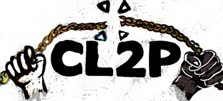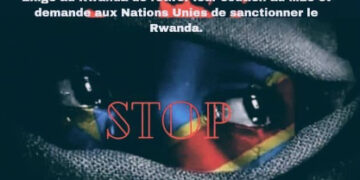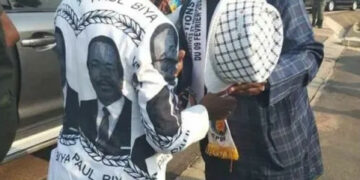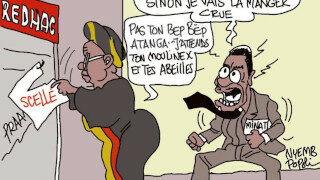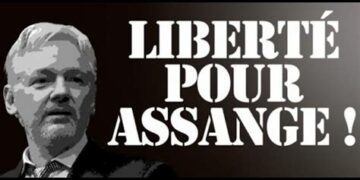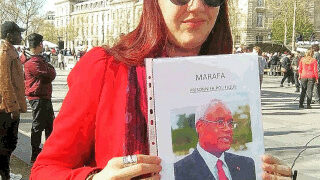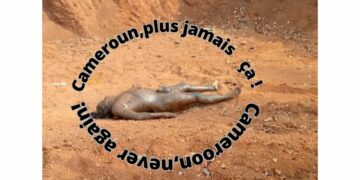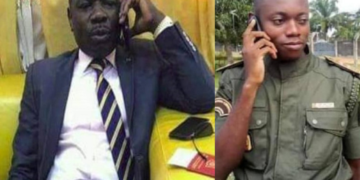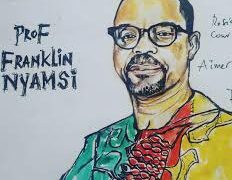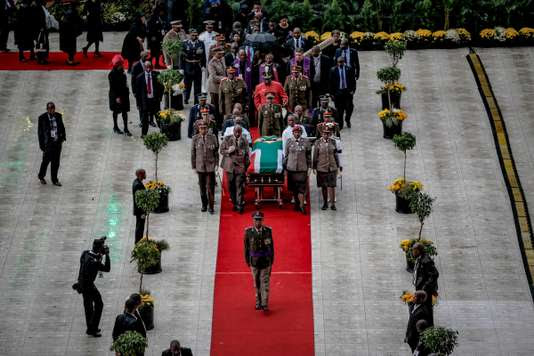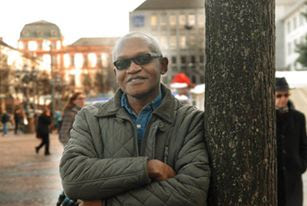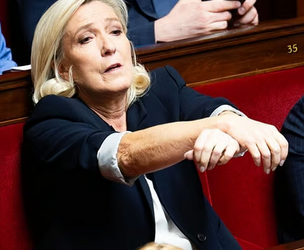Dans la grande famille de l’ANC, tout enterrement de dignitaire se transforme en moment politique. Avec Winnie Mandela, à plus forte raison, une cérémonie d’inhumation ne pouvait se dérouler dans la quiétude des hommages convenus. La « mère de la nation » est décédée le 2 avril, à 81 ans. Dans le vieux stade d’Orlando, à Soweto, où ont retenti tant de clameurs depuis les temps de la lutte contre l’apartheid, une mise en scène magnifique a été préparée, samedi 14 avril, pour un enterrement en grande pompe.
Tout est chorégraphié au millimètre, hormis ce qui va se dire dans certains discours. Le Congrès national africain (ANC), après dix jours de cérémonies à travers le pays, enterre l’une de ses géantes, et l’une des plus inclassables personnalités de son mouvement : Nomzamo « Winnie » Madikizela-Mandela.
Dans les gradins, il y a le peuple qui l’aimait tant. Ceux qui n’ont pas eu peur de braver les difficultés logistiques pour venir s’asseoir dans les gradins dès quatre heures et demie du matin, pour être certain d’y être quand tout commencera, cet hommage en grand dans une famille politique déchirée par ses factions. Aujourd’hui, on devrait, en théorie, essayer d’oublier les divisions, mais les enterrements de l’ANC, décidément, ne sont pas faits pour se transformer en moments de tiédeur, mais d’accusations.
Injustice
Dans les tribunes, peu de dignitaires étrangers, aucune des stars mondiales qui aimaient tant venir chauffer leur aura à celle de l’ANC des grandes années. Il n’y a là que les habitués de la maison d’Orlando Ouest, y compris quelques vieux amis de l’étranger, en tout petit nombre, mais qu’importe. Cela ne fait que resserrer l’assemblée sur elle-même. On pourra d’autant plus facilement utiliser l’isiZulu ou l’isiXhosa pour les discours.
Nul ne se souvient des mots prononcés par les présidents du monde entier lors de l’enterrement de Nelson Mandela, en 2013. Que peut bien avoir dit Barack Obama, ce jour-là ? Avec celle qui enrageait d’être présentée comme « sa femme » dans les dernières années de leur mariage devenu malheureux, ce sera tout à fait différent.
L’une de ses deux filles, Zenani, aborde frontalement la question qui blesse : au moment du décès de Winnie Mandela, des articles jugés assassins ont déclenché un grand mouvement d’opinion en Afrique du Sud, créant un phénomène de rejet, d’écœurement, bien au-delà de la famille. L’impression dominante est d’avoir assisté à une répétition de l’injustice faite à Winnie Mandela tout au long de sa vie : on a rappelé toutes ses frasques, les débordements meurtriers de son groupe de sécurité, le Mandela United Football Club.
On a un peu oublié ses souffrances, ses luttes, son courage. Comment ne pas voir la continuité ? Zenai affirme que « cela dure depuis vingt-cinq ans », depuis que l’affaire Stompie a éclaté, du nom de ce petit activiste torturé et tué par des membres de l’entourage de Winnie. Or d’anciens policiers du temps de l’apartheid ont joint leur voix à la confusion, indiquant après toutes ces années qu’ils avaient été missionnés pour lui nuire, saper sa réputation. Certains affirment que, dans ce crime, Winnie n’était pour rien. Les membres du Mandela United Football Club étaient au fond le reflet d’une époque, toute de violence aveugle et de manipulations.
Toujours debout
Mais Winnie Mandela a payé au sein de son propre parti. Pendant les années qui ont suivi la fin de l’apartheid, elle n’a été qu’un temps à la tête de la Ligue des femmes de l’ANC, et bien que présente dans le Comité exécutif national, n’a jamais occupé l’un des six postes de direction du parti. Thabo Mbeki, l’ancien président, la jugeait « populiste » et n’a jamais caché le dédain qu’elle lui inspirait.
Ils s’étaient du reste écharpés sur un sujet brûlant. Alors que le chef de l’Etat était arrivé à la conclusion que le sida n’existait pas, selon une série de raisonnements torturés, Winnie Mandela, elle, clamait haut et fort que cette opinion était criminelle, conduisant à laisser mourir des foules de malades faute de traitement. Personne n’a oublié, dans le stade d’Orlando Ouest. Lorsque le nom de Thabo Mbeki est cité parmi les personnalités assistant à la cérémonie, il est copieusement hué. Pendant les heures qui suivent, masque de cire, il reste tétanisé, alors que le stade tout entier donne libre cours à son émotion, ondule, chante, applaudit…
Winnie Mandela, jamais, n’a laissé indifférent. Et Zenani prend les accents de cette femme toujours debout malgré les duretés de la vie, pour dire son courroux, de l’avoir vue jugée avec tant de sévérité alors que le même traitement était épargné « à ses homologues masculins ». « Nous nous sentons offusquées [avec sa sœur] qu’on l’ait dépeinte comme un monstre, un démon. »
Accuser, c’est aussi ce qu’a choisi de faire Julius Malema, le commandant en chef des Combattants pour la liberté économique (EFF, Economic Freedom Fighters), pour lesquels Winnie Mandela était une source d’inspiration. Dès les premiers mots, il enfourche son thème de bataille, « l’expulsion des terres sans compensation » des fermiers blancs, mais aussi la « nationalisation des banques et des mines », la base de son programme.
S’il est une personne qui, en Afrique du Sud, avait identifié très tôt la question de la terre comme étant d’une force symbolique et matérielle sans pareille, c’est bien Winnie Mandela. Elle avait même reproché à Nelson Mandela d’avoir trop concédé au pouvoir blanc lors des négociations des années 1990, notamment en acceptant qu’on garantisse par un article de la Constitution la protection de la propriété privée. C’est ce verrou qu’il est envisagé de faire sauter désormais. Une réforme de la Constitution allant dans ce sens est désormais à l’étude.
Mais Julius Malema va plus loin. Il accuse certains invités présents de faire partie de ceux qui ont contribué à la diabolisation de Winnie Mandela. « Tu as été trahie par les tiens. Certains de ceux qui t’ont vendue au régime [de l’apartheid], ils sont là et ils pleurent plus fort encore que ceux qui ont été à tes côtés. » Il implore alors, de manière rhétorique, l’esprit de Winnie Mandela de lui « envoyer un signal pour savoir comment on doit traiter ces gens », et le sous-entendu est lourd d’une violence encore verbale, mais qui menace le futur.
Mauvais augure
Il faudra, pour clore cette cérémonie d’enterrement échevelée et calmer les esprits, le beau discours de Cyril Ramaphosa à la gloire d’« une géante, un soldat, la mère de la nation », traitée, comme il l’admet, de manière terriblement injuste par l’ANC. Alors qu’il cherche à faire revenir vers le parti qu’il dirige, les électeurs EFF radicalisés, le nouveau président sud-africain a montré tout son talent pour faire semblant de ne pas avoir compris que les attaques de M. Malema le visaient directement. Dans les années 1980, il était, en effet, à la tête du syndicat des mineurs et, à ce titre, membre d’une large coalition, le Mass Democratic Movement, qui avait rompu les ponts avec Winnie, alors en plein dans sa dérive au milieu de son Mandela United Football Club que la direction de l’ANC en exil lui demandera de dissoudre.
Quelques jours plus tôt, une première cérémonie s’était tenue au même endroit, rassemblant la population de Soweto et des dignitaires du parti, des sympathisants, des admirateurs de Winnie Mandela, dans une ambiance moins protocolaire. Ce mercredi, le ton était à la fête, à l’effusion, à l’évocation passionnée des meilleurs moments de la « mère de la nation », Mam’Winnie, comme on l’appelle avec tendresse et respect.
Lire aussi : Winnie Mandela, en liberté toujours
Venu tout droit de Port Elizabeth, dans la province du Cap-Oriental, dont Winnie Mandela est originaire, l’évêque Kenneth Tyika, dénonçait déjà « l’assassinat » symbolique, dont elle avait été victime. Il disait son admiration pour cette femme inclassable, la seule à avoir identifié très tôt l’importance de la terre pour la population noire sud-africaine, la base de sa dignité. Il mettait aussi en garde contre les ratés éventuels de cette réforme. « Si cela n’est pas bien géré, nous aurons une guerre », affirmait-il. Dans les deux journées de commémoration, on ne voyait presque aucun Blanc dans le stade de Soweto. Un mauvais augure pour le futur de l’Afrique du Sud.
LE MONDE | Par Jean-Philippe Rémy (Johannesburg, correspondant régional)
[spacer style="1"]
Almost nothing trickled down to the township or the scores of would-be beneficiaries after that first meeting in 2012. The only local residents to get a free trip to India were members of a church choir headed by Mr. Zwane.
In the generation since apartheid ended in 1994, tens of billions of dollars in public funds — intended to develop the economy and improve the lives of black South Africans — have been siphoned off by leaders of the A.N.C., the very organization that had promised them a new, equal and just nation.
Corruption has enriched A.N.C. leaders and their business allies — black and white South Africans, as well as foreigners. But the supposed beneficiaries of many government projects, in whose names the money was spent, have been left with little but seething anger and deepening disillusionment with the state of post-apartheid South Africa.
While poverty has declined since the end of apartheid, inequality has risen in a society that was already one of the world’s most unequal, according to a recent report by the World Bank and the South African government.
South Africa has a large, advanced economy, an aggressively free press and a wealth of independent organizations and scholars who keep a close watch on government malfeasance. But even with its vibrant democracy, in which the details of corruption schemes are routinely aired and condemned by the news media and opposition politicians, graft has engulfed the country.

The nation was governed for nine years by the scandal-plagued President Jacob Zuma, whose close ties with the Gupta family — three Indian brothers at the helm of a sprawling business empire built on government contracts, including the dairy farm — outraged voters. Their cozy relationship contributed to the A.N.C.’s recent electoral losses and helped lead to Mr. Zuma’s ouster two months ago.
Promising a “new dawn,” Mr. Zuma’s replacement, Cyril Ramaphosa, has said that he would make fighting corruption a priority as the nation’s new president. But he is also a veteran A.N.C. insider, and the early signs have not been encouraging.
Having become party leader by a razor-thin margin, Mr. Ramaphosa has tried to keep together a fractured A.N.C. by moving cautiously. He formed his first cabinet by appointing some well-respected officials, but also included allies — his own and Mr. Zuma’s — who have been accused of corruption by the Public Protector’s office and good governance groups.
Beyond that, politicians who long oversaw provinces rife with public corruption, including the one where the dairy farm is, now sit at the top of the A.N.C.’s hierarchy.
National prosecutors, often criticized for being servile to the sitting president, say they are trying to recover more than $4 billion lost to corruption related to the Gupta family’s undue influence on Mr. Zuma’s administration.
And that is just a small measure of the corruption that has whittled away at virtually every institution in the country, including schools, public housing, the police, the power utility, South African Airways and state enterprises overseeing everything from rail service to the defense industry.
Almost no one comes out of this looking good.
At just under $21 million, the money lost in the Vrede dairy farm may seem small. But it is a big test of whether South Africa’s new government has the power and the will to confront public corruption at its source.
The police have apprehended some low- and midlevel officials involved in the dairy farm, the first arrests related to a high-profile case of public corruption during the Zuma presidency. But notably, they have yet to pursue any A.N.C. officials. Mr. Zwane has not faced any charges. What’s more, the provincial premier who approved the project, Ace Magashule, was recently elected secretary general of the A.N.C., elevating him to the top ranks of the party’s leadership.
The endless scandals have also raised serious questions about the complicity of major Western companies, with multiple investigations scrutinizing the role they may have played in enabling corruption and weakening the country’s institutions.
South African regulators have urged the police to begin a criminal inquiry into McKinsey, the American consulting giant, over its relationship with a Gupta-linked company in a contract involving a state-owned utility. A South African court has frozen the $83 million McKinsey was paid for the contract, and the firm says it will return the fee.
Regulators say they have also pressed the police to investigate KPMG, the Big Four auditing firm based in the Netherlands, for its work for the national revenue service in 2015. KPMG has acknowledged that elements of the work “should no longer be relied upon” and offered to pay back its consulting fees.
SAP, the German software behemoth, is being investigated by the United States Department of Justice and the Securities and Exchange Commission after it disclosed payments to intermediaries on state contracts that may have contravened the Foreign Corrupt Practices Act.
International banks have been ensnared in the scandals, too. HSBC and Standard Chartered have been accused by a British lawmaker of laundering the Guptas’ ill-gotten gains. HSBC says it has closed a number of accounts that belonged to front companies operated by the Gupta family.

Many trace the deep corruption in the nation to a fundamental flaw in South Africa’s transition from white rule to democracy a generation ago. In the grand bargain struck between the apartheid government and the A.N.C., headed by Nelson Mandela, a transfer of power was carried out peacefully, disproving predictions of civil war and earning Mr. Mandela accolades as a visionary peacemaker.
But the deal was reached on what many South Africans today consider Pyrrhic terms: The black majority was allowed to control politics, but much of the country’s economic resources, including land, has remained in the hands of white South Africans and a small group of other elites.
In the early years of A.N.C. rule, Mr. Mandela and other top leaders, who had helped defeat apartheid but had no personal savings, received houses, vehicles and money from white business leaders — essentially bribes, critics say.
A smattering of influential figures, like the current president, Mr. Ramaphosa, amassed extraordinary wealth. They were allowed to buy shares of white-owned companies on extremely generous terms and invited to sit on corporate boards. They acted as conduits between the governing party and the white-dominated business world.
Some of the A.N.C. leaders who were left out of that bonanza quickly found a new road to wealth: lucrative government contracts. The public tap became a legitimate source of wealth for the well connected, but also a wellspring of corruption and political patronage, much as it had been for the white minority during apartheid.
Over the years, Mr. Zuma and his allies, while never admitting corruption, often played down its corrosive effect on society and emphasized the need to redistribute wealth to black South Africans. It is an argument that Mr. Zuma is expected to make in defending himself against recently reinstated charges of corruption in an arms deal from the late 1990s.
While Mr. Mandela is still revered in the West, his legacy is regarded more critically in South Africa, especially by some young black people. To them, he sold out the country’s black masses to the white business elite.
Even some of Mr. Mandela’s longtime supporters struggle to defend the deal that he struck to bring democracy to South Africa. Ultimately, it left most black people in poverty while benefiting a small elite, including the chief negotiator during the talks, Mr. Ramaphosa.
After 27 years as a political prisoner, Mr. Mandela did not understand South Africa’s political economy and agreed to a settlement that failed to secure black South Africans’ economic independence, said Mamphela Ramphele, an anti-apartheid activist who became close to Mr. Mandela. She later went on to serve as a managing director of the World Bank.
“He didn’t know any better,” Ms. Ramphele said.

Entrenched Inequalities
The dairy farm case is emblematic of the many ills afflicting South Africa a quarter-century after the end of apartheid. It shows how corruption, in a government controlled at all levels by a single party, has entrenched old racial inequalities.
About 125 miles southeast of Johannesburg, in the province of Free State, Vrede is a small farming town with discount chain stores, two supermarkets and a gas station. A cemetery and a police station — buffers during the apartheid era — still separate Vrede from the neighboring black township of Thembalihle.
As in so many other townships, the level of local corruption can be quickly gauged by the quality of government housing for the poor. In one of the most common sources of corruption, money and building materials are diverted from a housing project, often leaving behind shoddy dwellings for poor residents who have waited years or decades to move out of shacks.
In a new outpost of the township, single-family government houses were so poorly built that many have collapsed, while new houses are being erected on shaky foundations and frames, with deep cracks spreading across extremely thin walls.
In many ways, the area is a microcosm of the enduring economic imbalance in South Africa. Nationally, black people make up 80 percent of the population, but most remain shut out of economic opportunities. White people, accounting for 8 percent, retain an oversize influence on the economy.
Nearly all of the commercial farmers around Vrede are white, as is the main government contractor. In the adjoining township, black people operate small taverns and basic carwashes. But in the town of Vrede itself, white people still own all of the faded buildings on the main street, where they — along with immigrants from other African nations and countries like Pakistan and Bangladesh — operate shops. Black people, who were not allowed to live in the town under apartheid, now own or rent only about 10 percent of its residences.

“This system that was built for us, blacks, it’s very difficult for us to create our own businesses,” said Veli Thulani Tshabalala, 29, who runs a computer and cellphone repair shop with his cousin. They are the only black South Africans to operate a store in Vrede.
Pieter Bergh, 83, a white South African who served on Vrede’s City Council in the years immediately before and after the end of apartheid, agreed that little has changed for black South Africans since 1994 and that the economic inequality has remained static.
“They only received the power to vote — that was all,” Mr. Bergh said, adding that he “definitely” considered that a historical mistake.
In the late 1990s, officials were purged from city government and replaced by A.N.C. appointees with little experience. The purge, which occurred at all levels of government across the nation, contributed to the corruption that emerged toward the end of Mr. Mandela’s term.
Here in Free State, one of the first post-apartheid cases of corruption in government revolved around Mr. Magashule, the A.N.C.’s current secretary general.
Mr. Magashule, now 59, has served as the party’s leader in Free State since the very end of apartheid in 1994. He grew up in Parys, a small town in the province. During apartheid, he was an underground A.N.C. operative whose boldness caught the attention of Winnie Mandela, Nelson’s wife and an anti-apartheid activist.
After white rule ended, he oversaw economic development in the cabinet of the first post-apartheid provincial premier, Mosiuoa Lekota. In an interview, Mr. Lekota said he had caught Mr. Magashule stealing government funds — a charge that Mr. Magashule, whose spokespeople did not respond to interview requests for this article, has long denied.
Mr. Lekota said he had fired Mr. Magashule, but was overruled by his patron, the A.N.C.’s deputy secretary general at the time: Mr. Zuma.

In the early days after the end of apartheid, Mr. Zuma openly complained about the A.N.C. leaders who were getting rich. Most — like Mr. Ramaphosa and Tokyo Sexwale, another anti-apartheid activist — were favorites of Mr. Mandela.
“Zuma did go to some of the other guys and said to them, ‘This is what Mandela is doing. We must wake up and we must go for the money ourselves,’ ” said Mr. Lekota, who left the A.N.C. to found his own party, the Congress of the People, in 2008.
Mr. Magashule went on to flourish inside Free State. He became premier of the province in 2009 just as Mr. Zuma became president.
Like other powerful premiers, he was able to turn his province into a fief, said Mr. Lekota and several provincial officials from the A.N.C., as well as its historical ally, the South African Communist Party.
Taxes are mostly collected by the national government, and the money is redistributed to the provinces, where it is spent with little oversight. Free State — a rural economy where black people remain dependent on the A.N.C. for jobs and government contracts — has remained a stronghold for the party even as it has lost support among middle-class black voters in urban areas.
Mr. Magashule’s ambitions, however, were never confined to the province. Like Mr. Zuma, he forged a relationship with the Gupta brothers, who had befriended some high-ranking A.N.C. figures after arriving in South Africa from their native India in the early 1990s. Mr. Magashule’s son, Tshepiso, worked for the Guptas, and, according to emails leaked from a Gupta-company server, served as a conduit to his father’s office.
Under Mr. Magashule’s governance, many of the province’s public services departments teetered on the brink of insolvency, according to A.N.C. officials and opposition parties. In a harsh report in 2017, the national auditor said that Free State’s government showed “a lack of accountability and commitment towards clean administration,” adding that the situation had worsened in recent years.
“If you find that the one who is supposed to be the custodian of the purse like the premier — he is the one who is involved in corrupt practices — it becomes easy then for others also to get involved,” said Thabo Manyoni, an A.N.C. official in Free State who was once a close friend and deputy of Mr. Magashule.
“You end up in a situation where nobody is able to stop anyone else because we all are doing it,” Mr. Manyoni said.

Suspicions From the Start
To many, the dairy farm project appeared to be a swindle from the beginning.
For starters, there were ample suspicions about the pitchman, Mr. Zwane.
“I know this guy,” said Mr. Dhlamini, the would-be beneficiary who was also the chairman of Vrede’s arm of the African Farmers Association, a national organization for black farmers. “I don’t trust him.”
As he climbed the political ranks, Mr. Zwane often came back to Thembalihle, the black township next to Vrede. Sometimes, he doled out fistfuls of cash from the trunk of his latest luxury car, said A.N.C. and opposition politicians, as well as many residents.
Throughout the township and town, many people shared the same wariness of Mr. Zwane. His meteoric rise had been too fast and seemed tied to the corruption taking hold in the A.N.C. and in Free State.
Mr. Zwane, who declined through a spokesman to comment for this article, grew up on a nearby farm and moved to Thembalihle in his teens. People remember him as an undistinguished student who, after high school, taught the children of black farm laborers in a nearby village where he met his future wife. The couple lived next to the school building, in a low, two-room concrete structure that is still used as a schoolteacher’s residence.
There, villagers remember Mr. Zwane as an engaged teacher, at least until he became a district councilor and his interests turned to politics. Soon, Mr. Zwane rose swiftly in the party, as well as in local and district governments, thanks in great part to his close relationship with the province’s head of the A.N.C., Mr. Magashule, according to politicians in Free State. He joined Mr. Magashule’s cabinet in 2009 and a few years later took over the agriculture portfolio.
When Mr. Zwane became the provincial minister of agriculture, many black farmers in Vrede rejoiced. Like others in the country, they had neither capital nor land. With a local son heading the province’s department of agriculture, they thought their “lives were going to change,” recalled Meshack Ncongwane, the deputy chairman of Vrede’s African Farmers Association.
A dozen black farmers from Vrede chartered a bus, each paying about $20, to attend Mr. Zwane’s swearing-in ceremony in the provincial capital, Bloemfontein, about four hours away. Even the association’s chairman, the skeptical Mr. Dhlamini, went along.

“We were happy,” Mr. Ncongwane said, adding, in hindsight, “although we were happy for a crook.”
In 2012, Mr. Zwane and agricultural department officials arrived in Vrede to promote the dairy farm project. Flanked by the council speaker, Roseline Zwane, known as Topsy — who happened to be his wife — and by his longtime ally, Mayor Tlokotsi John Motaung, Mr. Zwane told the crowd about a dairy farm that would empower black farmers and create 150 jobs.
Shortly afterward, his department signed the first of its two dairy farm agreements with a company called Estina.
This was a peculiar choice. Estina was to buy cows for local farmers and process milk at the farm. But the company was headed by a businessman from India who had a background in information technology — not in farming. Yet, importantly, he had long worked for the Guptas.
Despite the project’s sketchy details, Mr. Zwane signed off on it and asked the provincial treasury to start paying Estina, according to an investigation by the National Treasury. Initially, he was overruled by lawyers in Mr. Magashule’s office, who deemed the contract invalid because procurement rules, like a competitive bid, had not been followed.
But that was only a hiccup. The province signed another contract with Estina the following month — this time with the lawyers’ blessing. That agreement stated that Estina would invest just under $20 million in the project and the province would contribute about $30 million over three years. Local farmers, the so-called beneficiaries, would retain 51 percent of the shares.
There was “something fishy” from the start, said Doctor Radebe, who was a councilor for the opposition Democratic Alliance in Vrede. Mr. Zwane and the agricultural officials presented no business plan or budget for the project, but they and the mayor insisted on pressing ahead, Mr. Radebe said.
The local municipality quickly decided to hand over 3,400 hectares, or about 8,400 acres, of land for the dairy farm.
In fact, the municipality was so determined to get the project underway that it compensated four white commercial farmers, who had been leasing the land for about $80,000 a year, in order to prematurely break their leases. Later that year, just before Mr. Zwane and his local choir left for India, on a trip sponsored by a Gupta company, the province leased the farm to Estina — rent-free, for 99 years.
In an interview, Mayor Motaung said, “We had no doubt that the plan will work.”
But the mayor acknowledged that Mr. Zwane presented no detailed plan or document about the proposed dairy farm. Even basic details — like the criteria for selecting the beneficiaries — were missing, the mayor said, acknowledging that his role in the project was now under scrutiny.
The payments to Estina began months later. Court documents show that the province deposited just under $21 million in two Estina bank accounts over three years. Days after every payment, the company transferred the entire sum to other accounts. From there, prosecutors say, the money was withdrawn by individuals and other Gupta-linked companies that had little to do with the farm.
In fact, prosecutors say that only about 1 percent of the money invested by the province actually went into dairy farming. Beyond that, the National Treasury found no evidence that Estina ever invested its own money in the project, despite its obligation to do so.
Emails leaked from a Gupta company server indicate that some of the money was sent to the United Arab Emirates and put into accounts registered to the Guptas. The money then made its way back to South Africa through a maze of bank transfers, according to spreadsheets, logs and an invoice in the email trove.
The emails, amounting to thousands of exchanges, were leaked last year to South African news organizations and an anti-corruption group. It is not known who leaked them, though they soon fanned national outrage at the Gupta family and at Mr. Zuma. The Guptas denied the authenticity of the emails, but some A.N.C. officials included in the correspondence confirmed that they were real.
In one of the emails, Gupta companies paid one another for expenses at a relative’s lavish four-day wedding in 2013, including fireworks, dancers, chocolates and scarves.
In another exchange, KPMG, then an auditor of the Gupta companies, ignored a junior employee’s protest and allowed the Gupta family to write off some of the expenses at the wedding as business costs.
“I have never been to an event like that,” Moses Kgosana, a KPMG executive who attended the wedding, gushed to a Gupta brother in one of the emails, calling it “an event of the millennium.”
The accounting firm has since acknowledged that its actions “fell well short of the quality expected.”
Many of the problems surrounding the dairy farm could have been ignored had the province not tried to tap into a national fund for struggling farmers. The national government initially agreed to give about $4 million to the project on the condition that the province submit, among other things, a list of 100 poor farmers who would benefit from the farm.
When the government found no evidence that local farmers were involved, it sent National Treasury auditors to investigate in 2013. Though Mr. Zwane, sometimes accompanied by his wife, had held meetings to look for beneficiaries, no official list had been drawn.

After the auditors started asking questions, a list of beneficiaries — between 80 and 100, depending on the version — was hastily assembled.
Some were genuine farmers. “Others, they are not even farmers,” Mr. Radebe said, adding that many were A.N.C. supporters. “They don’t even have a cat.”
Estina did try its hand at dairy farming in Vrede. When the National Treasury’s investigators visited in 2013, they found about 350 cows and some buildings under construction. But the seemingly inflated costs — including $215,000 for a manually sliding gate and a guardhouse — drew scrutiny from the opposition party.
And while the beneficiaries were supposedly the farm’s owners, they were never informed of the project’s developments. They were not even allowed to visit the premises.
Those who were serious about farming started to complain. At a meeting with officials in the provincial government, Mr. Dhlamini and Mr. Ncongwane, of the African Farmers Association, said that when they raised questions about the project, they were dismissed as noisy “frogs.”
That especially stung Mr. Dhlamini, who once was the only black South African business owner in Vrede. He ran a small record store called “Siyathuthuka,” or “We’re moving forward,” in the Zulu language, but was forced to shutter his store because of rising rents. He was now focused full time on farming and owned 35 cows.
In early 2014, the National Treasury sent a scathing report to Mr. Magashule, the premier of Free State, and told the province to stop paying Estina. But it took Free State another six months to take the farm back. The province even continued to pay Estina another $11 million after officially terminating the contract, court documents show.

In the end, a project meant to empower black farmers like Mr. Dhlamini further enriched the Guptas and one of the wealthiest white men in Vrede, Willie Basson. With a fleet of vehicles, construction equipment and billboards advertising his business all over town, Mr. Basson is the main government contractor in Vrede and helped build the dairy farm.
But he said that Estina mismanaged the business so badly that he ended up having to dig graves for as many as 100 cows, even though he had delivered feed for them.
“They just do projects like this to get money,” he said in an interview in his office. “That’s how they operate, but, luckily, they paid me every cent,” Mr. Basson said.
“Hey! It’s rotten in this place here,” he exclaimed, pounding on the table in front of him. “And we work with all of them, so we know.”

Ignoring Alarms
It was a measure of how corrupt South Africa had become a generation after the end of apartheid that nothing was done about the Vrede dairy farm case for years.
The national police and prosecutors looked away even after the National Treasury raised alarms about the project.
In Free State, some who spoke out against public corruption were suddenly killed in circumstances that, even in a country with widespread violent crime, aroused suspicions.
Moses Tshake, a provincial government auditor who inquired about projects in the agriculture department, was killed in a carjacking in 2013. In Warden, a town where Mr. Zwane has a large home, Vusi Mlaba, a politician who had campaigned against corruption in public housing, was fatally shot a dozen times just outside his home in 2016. Police investigations resulted in no arrests in either case.
As for Mr. Zwane, the dairy farm hardly hurt his career.
During Mr. Zuma’s presidency, the Gupta brothers increasingly acquired economic and political influence by forging close ties with the president, his son and political allies like Mr. Magashule, the provincial premier who endorsed the dairy farm project. A lawyer for Atul Gupta, from whom prosecutors tried to recover public money spent on the dairy farm, did not respond to a request for an interview with his client.
The Guptas’ influence, and possibly direct role, in the appointment of ministers and other important government officials has been investigated by the Public Protector and is expected to be a focus of a recently begun government inquiry into public corruption.
In August 2015, according to the leaked emails, Tony Gupta, the youngest of the three brothers, forwarded Mr. Zwane’s résumé to Duduzane Zuma, one of the president’s sons, who was a director of many companies operated by the Guptas. Two months later, Mr. Zwane, whose highest qualification is a teacher’s diploma, became South Africa’s new minister of mineral resources, one of the most important — and potentially lucrative — portfolios.
Shortly after his appointment, Mr. Zwane went to Zurich with Tony Gupta and met with an executive from Glencore, the giant international commodities and mining firm. At the time, the Guptas were trying to buy a Glencore coal mine. In a 2016 report on corruption, the Public Protector called Mr. Zwane’s lobbying in Switzerland “potentially unlawful.”

The ‘Premier League’
Last December, A.N.C. delegates from all over the country chose Mr. Magashule, Free State’s longtime premier, as the party’s secretary general — one of the top four positions in the party. Mr. Magashule had been one of Mr. Zuma’s fiercest backers, along with two other provincial premiers who became known in the South African news media as the “premier league.” They had endorsed Mr. Zuma’s chosen candidate as the A.N.C.’s next president.
But, at the last minute, one of the premiers, David Mabuza, switched sides, handing a narrow victory to Mr. Ramaphosa. Afterward, Mr. Ramaphosa made Mr. Mabuza — whose province, Mpumalanga, became known for political killings and endemic corruption during Mr. Mabuza’s decade as premier — the nation’s deputy president.
With a new president in charge, the national police and prosecutors have started moving against some individuals involved in the dairy farm case. Eight people were charged with fraud, and others had their assets linked to the farm frozen. But a judge released most of the frozen assets in March. The next court hearing in the criminal case is scheduled for August.
Mr. Zwane, who was not appointed to Mr. Ramaphosa’s new cabinet, has kept out of the public eye in recent weeks. Neither he nor Mr. Magashule has shown any willingness to answer questions about the dairy farm from the news media or Parliament — reinforcing the public perception that A.N.C. officials are above the law.
“What has gone wrong has gone wrong under their watch,” said Mathole Motshekga, a senior A.N.C. official who is a member of the party’s decision-making body, the national executive committee, and is also chairman of Parliament’s justice committee. “We expect, and the public expects, that they should take responsibility for what has happened. We are waiting to hear what they have to say, because we don’t expect people in such positions to be absentee landlords.”
But many have given up on the A.N.C. Though the money lost in the dairy farm paled in comparison to the scale of corruption inside South Africa’s state-owned enterprises, it resonated deeply across the nation. Government money meant to help poor farmers simply vanished, the way it does across South Africa, and so far none of the A.N.C. officials in charge at the local or provincial levels have been held to account.
As Mr. Ramaphosa pledges to clean up the South Africa he has inherited from Mr. Zuma, this case will test his capacity to do just that. A spokeswoman for Mr. Ramaphosa said he was unavailable for interviews.
One of the would-be beneficiaries, Adam Khatide, 55, retired early from his teaching job believing that the Vrede dairy farm would take off. In the fallout, he lost faith in the power of his vote.
“It’s voting for nothing,” he said. “Just taking people, putting them in office, and then they eat money.”
When democracy arrived for black people in 1994, Mr. Khatide drove elderly neighbors to voting stations, where they elected Mr. Mandela as the first president of the new South Africa.
“We managed to bring democracy, which is not working for us now. It’s working for individuals,” Mr. Khatide said, laughing. “I cannot cry. When I’m crying, it’s just the same. It’s better I must laugh.”

